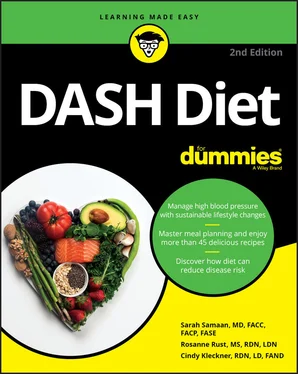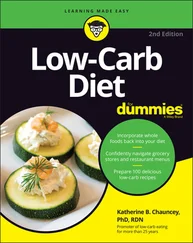1 ...8 9 10 12 13 14 ...18  The results of Omni-Heart show that by cutting carbs just a bit and adding a small dollop of good fat or high-quality protein, the DASH diet can be enhanced and enriched. More important, these results reveal that you shouldn’t be afraid to reduce grain servings (to 5 to 6 servings) in DASH just a little, as long as you substitute high-quality protein and healthy monounsaturated fats. Healthy food should never be boring. Whether simply made or worthy of a master chef, a good meal is not only sustenance but also one of life’s true and pure pleasures.
The results of Omni-Heart show that by cutting carbs just a bit and adding a small dollop of good fat or high-quality protein, the DASH diet can be enhanced and enriched. More important, these results reveal that you shouldn’t be afraid to reduce grain servings (to 5 to 6 servings) in DASH just a little, as long as you substitute high-quality protein and healthy monounsaturated fats. Healthy food should never be boring. Whether simply made or worthy of a master chef, a good meal is not only sustenance but also one of life’s true and pure pleasures.
DASH: Wellness through Optimal Nutrition
People have known for more than a century that high blood pressure is harmful, yet effective treatments didn’t hit the market until the 1950s. Thanks to the hard work of medical researchers around the world, a wide variety of medications are now available. This is great, but medications can be costly, and even the very best options have potential side effects. Take a look at these stats:
More than two-thirds of people with hypertension need at least two drugs to keep their numbers under control.
Blood pressure medications can be lifesaving, but, depending on the pill, side effects can occur in up to 15 percent of people.
A typical blood pressure pill lowers blood pressure about 10 points — about the same reduction you see when following DASH.
By cutting sodium to 1,500 milligrams, à la low-sodium DASH, the effect could be equal to two different drugs (take a look at Table 2-1to see just how effective reducing your daily sodium intake to 1,500 milligrams can be).
TABLE 2-1Effects of a 1,500-Milligram Sodium DASH Diet on Reducing Both Systolic and Diastolic Blood Pressure
| Characteristics |
Systolic Blood Pressure (in Millimeters of Mercury) |
Diastolic Blood Pressure (in Millimeters of Mercury) |
| Hypertensive |
–12 mm Hg |
–6 mm Hg |
| Pre-hypertensive |
–7 mm Hg |
–4 mm Hg |
| Age over 45 |
–12 mm Hg |
–6 mm Hg |
| Age under 45 |
–6 mm Hg |
–3 mm Hg |
| African American (all) |
–10 mm Hg |
–5 mm Hg |
| White and others (all) |
–8 mm Hg |
–4 mm Hg |
| Male |
–7 mm Hg |
–4 mm Hg |
| Female |
–11 mm Hg |
–5 mm Hg |
Source: Study from the New England Journal of Medicine, 2001.
 Ironically, health experts know more about how to lower blood pressure with diet and lifestyle than ever before, but rates of hypertension continue to rise. That’s because people are eating more of the wrong stuff and less of the good stuff, exercising less, and carrying more weight. You don’t have to be a genius to see that you can save a lot of dough and feel better if you get in sync with DASH.
Ironically, health experts know more about how to lower blood pressure with diet and lifestyle than ever before, but rates of hypertension continue to rise. That’s because people are eating more of the wrong stuff and less of the good stuff, exercising less, and carrying more weight. You don’t have to be a genius to see that you can save a lot of dough and feel better if you get in sync with DASH.
An analysis from researchers at the University of California, San Francisco reported that if Americans simply shaved off a third of their average daily sodium intake, the following would occur:
New heart disease cases could be cut by up to 120,000 per year.
Strokes would be reduced by as many as 66,000.PRESENTING THE “BEST OVERALL DIET”In January 2013, U.S. News and World Report reviewed 29 different diets designed to improve health and well-being and awarded DASH “Best Overall Diet.” The publication based this designation on several criteria, including the following:Nutritional valueHeart healthDiabetesSafetyEase of useEffectiveness for short- and long-term weight lossWhen the results were tallied, DASH came out ahead of the pack, which included the Mediterranean Diet, the Mayo Clinic Diet, and the Therapeutic Lifestyle Changes Diet (from NIH). DASH has remained at or near the top of the rankings ever since. When heart doctors and jaded journalists can agree on something this important, it’s worth taking note.
As many as 99,000 heart attacks could be averted.
92,000 lives could be spared.
If those numbers don’t impress you (and we’re not sure why they wouldn’t), consider this: If everyone trimmed their salt habit, healthcare cost savings in the U.S. alone could amount to as much as $10 billion to $24 billion annually. And this doesn’t even get into the benefits that may surface if everyone chose to put a little more DASH into their lives. That’s powerful medicine indeed.
Chapter 3
Improving Your Overall Health
IN THIS CHAPTER
 Seeing how DASH fights high blood pressure
Seeing how DASH fights high blood pressure
 Understanding the DASH diet’s effects on cholesterol
Understanding the DASH diet’s effects on cholesterol
 Losing weight with DASH
Losing weight with DASH
 Tackling diabetes with DASH
Tackling diabetes with DASH
 Considering how DASH can lessen your risk for cancer
Considering how DASH can lessen your risk for cancer
DASH is a dietary multi-tasker. If you follow a DASH-worthy diet, you’ll reduce your risk of numerous life-changing and potentially deadly cardiovascular conditions. You may also drop your cholesterol, maintain a healthier weight, cut your risk for diabetes, and even reduce your likelihood of developing certain types of cancer. We explain how in this chapter. (For an in-depth look at the conditions we cover in this chapter, head to Part 2.)
Fighting the Silent Killer: Hypertension
Hypertension can lead to a number of cardiovascular ailments, including heart attacks, congestive heart failure, heart rhythm disorders, and stroke. (We tell you more about these surprisingly common conditions in Chapter 6.) Hypertension is also a leading cause of kidney failure and can contribute to dementia and eye disease.
 Because it usually causes no symptoms until one of these serious conditions develop, hypertension is often known as the “silent killer.” The tragedy is that high blood pressure is easily diagnosed and can usually be effectively treated. Even better, it can often be prevented.
Because it usually causes no symptoms until one of these serious conditions develop, hypertension is often known as the “silent killer.” The tragedy is that high blood pressure is easily diagnosed and can usually be effectively treated. Even better, it can often be prevented.
The DASH diet was created specifically to test the effects of a dietary pattern that includes a variety of foods known to help lower blood pressure. In fact, it was one of the first mainstream attempts to test the potential of what is now known as functional medicine. Although DASH has other very beneficial effects on your health and well-being, it was born to prevent or reduce hypertension. The following sections break down exactly why blood pressure concerns are relevant for everyone and how adopting a DASH lifestyle can help alleviate those concerns.
Why blood pressure matters
High blood pressure causes serious wear and tear on your heart, brain, and kidneys, so it’s critical that you take it seriously. Although a brief rise in blood pressure isn’t likely to cause permanent harm, your body isn’t designed to handle continuously high pressure. Just think of a garden hose gushing at full blast and imagine what that might do to your tender blood vessels.
Читать дальше

 The results of Omni-Heart show that by cutting carbs just a bit and adding a small dollop of good fat or high-quality protein, the DASH diet can be enhanced and enriched. More important, these results reveal that you shouldn’t be afraid to reduce grain servings (to 5 to 6 servings) in DASH just a little, as long as you substitute high-quality protein and healthy monounsaturated fats. Healthy food should never be boring. Whether simply made or worthy of a master chef, a good meal is not only sustenance but also one of life’s true and pure pleasures.
The results of Omni-Heart show that by cutting carbs just a bit and adding a small dollop of good fat or high-quality protein, the DASH diet can be enhanced and enriched. More important, these results reveal that you shouldn’t be afraid to reduce grain servings (to 5 to 6 servings) in DASH just a little, as long as you substitute high-quality protein and healthy monounsaturated fats. Healthy food should never be boring. Whether simply made or worthy of a master chef, a good meal is not only sustenance but also one of life’s true and pure pleasures. Seeing how DASH fights high blood pressure
Seeing how DASH fights high blood pressure Because it usually causes no symptoms until one of these serious conditions develop, hypertension is often known as the “silent killer.” The tragedy is that high blood pressure is easily diagnosed and can usually be effectively treated. Even better, it can often be prevented.
Because it usually causes no symptoms until one of these serious conditions develop, hypertension is often known as the “silent killer.” The tragedy is that high blood pressure is easily diagnosed and can usually be effectively treated. Even better, it can often be prevented.










